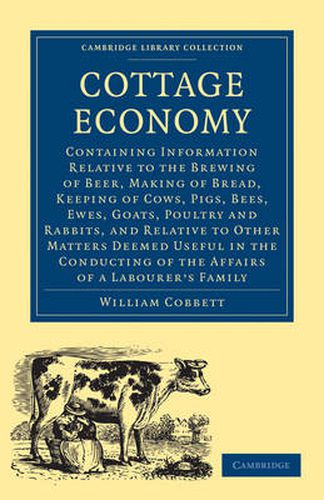Readings Newsletter
Become a Readings Member to make your shopping experience even easier.
Sign in or sign up for free!
You’re not far away from qualifying for FREE standard shipping within Australia
You’ve qualified for FREE standard shipping within Australia
The cart is loading…






William Cobbett (1763-1835) was at various times a soldier, a farmer, a radical activist and politician, and a journalist. At a time when the Industrial Revolution was dramatically changing the face of rural Britain, Cobbett was constantly concerned with improving the living conditions of the labouring classes. First published in 1821 as a series of pamphlets that sold over 30,000 copies, Cottage Economy demonstrates Cobbett’s philosophy that the labourer should be taught industry, sobriety, frugality and ‘the duty of using his best exertions for the rearing of his family’. With practical instructions, still relevant to those who seek to become self-reliant, Cobbett teaches the labouring classes of the nineteenth century the arts of brewing beer, keeping livestock, making bread, and ‘other matters deemed useful in the conducting of the Affairs of a Labourer’s Family.’ Cottage Economy performs timelessly as the quintessential guide to self-sufficiency.
$9.00 standard shipping within Australia
FREE standard shipping within Australia for orders over $100.00
Express & International shipping calculated at checkout
William Cobbett (1763-1835) was at various times a soldier, a farmer, a radical activist and politician, and a journalist. At a time when the Industrial Revolution was dramatically changing the face of rural Britain, Cobbett was constantly concerned with improving the living conditions of the labouring classes. First published in 1821 as a series of pamphlets that sold over 30,000 copies, Cottage Economy demonstrates Cobbett’s philosophy that the labourer should be taught industry, sobriety, frugality and ‘the duty of using his best exertions for the rearing of his family’. With practical instructions, still relevant to those who seek to become self-reliant, Cobbett teaches the labouring classes of the nineteenth century the arts of brewing beer, keeping livestock, making bread, and ‘other matters deemed useful in the conducting of the Affairs of a Labourer’s Family.’ Cottage Economy performs timelessly as the quintessential guide to self-sufficiency.